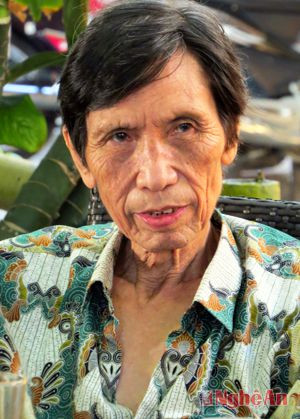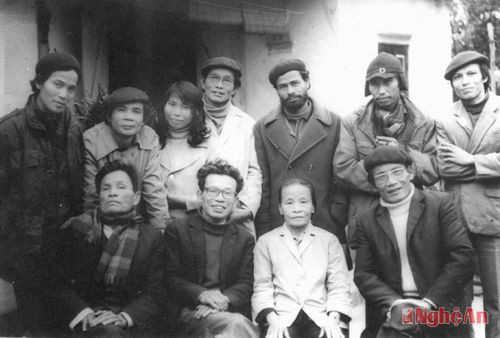Poet Thach Quy: Choosing the homeland to spend a lifetime
(Baonghean) - Editor's note: In literary creation, there are writers who love to travel, to go here and there, to many lands, to meet many people, from there to contemplate, to filter, to separate the turbid and bring out the clear to create their works. On the contrary, there are also writers who are closely and long-term attached to a land and use it as a launching pad to help their creative work flourish.
Poet Thach Quy lived, worked and was attached to his homeland Nghe An all his life. His poems are rich in themes, multi-dimensional in ideas, thoughts, deep and harmonious emotions, leaving many impressions in the hearts of readers. The most outstanding impression, in our opinion, is the beauty in the very vivid, very specific, very delicate verses that the poet evoked in every detail of life. Nghe An Newspaper reporter had an interview with the poet around the topic "Thach Quy's poetry with the beauty of Nghe An countryside". The following is the content of the conversation.
 |
| Poet Thach Quy |
PV:Dear poet Thach Quy, surely as a poet who is well-known, you have many opportunities to “fly far away”, to satisfy your wandering desire like many artists. But, you still choose your homeland to stay, to be attached to for the rest of your life, even though the homeland you write about has a “poverty” (name of a poem by poet Thach Quy - PV) that is heartbreaking. Is it because you “love your homeland to the point of being rigid, to the point of being “stubborn” as someone once said, or is there something else?
Poet Thach Quy:It is true that people often think that writers and artists in general have a passion for traveling. Some people choose new lands and new emotions to contemplate and clarify the meaning of their works. As for me, I choose my hometown. It is also possible that my hometown chooses me (laughs). Of course, it can be called a love for my hometown "to the point of being rigid and stubborn" as someone once wrote. Well, that is each person's opinion. But I ask you, why do you only read "poverty" and not see that in my poems there are many poems about the beauty of Nghe An?
PV:Oh, that’s right. I remember “Poverty” in your poem because it was very impressive. It was written in a playful yet heartbreaking way. But I still can’t forget the beauty of Nghe An countryside in your poem. Many readers love and are impressed by the specific details, the flowers, blades of grass, birds, fish, rows of trees, rocks… that poet Thach Quy described in his poem. Could you say a few words about the uniqueness, distinctiveness, and specificity of those images?
Poet Thach Quy:I write very honestly. The flowers, blades of grass, birds, fish… in my poems are all very real. No ornaments, no embellishments. I write them as they are. Here: “The water is crystal clear, the snakehead fish is full of prey/ Slowly gliding to greet each rice plant/ The fish smells the muddy footprints, bewildered/ Its round eyes open, bewildered, recognizing me”… That is the image of snakehead fish, Nghe people call it snakehead fish, every day, they still leisurely swim in the rice fields, in the ponds in the familiar villages, almost all of us have seen, have met? What is strange about it! Thach Quy’s poems do not exalt, do not lower, do not blacken, do not beautify those fish! They just appear, they swim around as they always do. Likewise, when Thach Quy’s poems talk about birds. Birds in the seasons “White grapefruit flowers around the yard/ Red longan flowers by the roadside/ Purple plums, red-whiskered bulbuls flying in a flurry/ Blue-ringed geese singing in the blue sky on the jackfruit tree/ The sound of ripe yellow orioles on ripe oval fruits”… Reading this poem, you must also feel that our countryside is very familiar, very close, what is strange? Those are longan flowers, grapefruit flowers, plums, yellow orioles, dear blue-ringed geese that have been attached to our countryside for thousands of years. Those familiar and close images, not only appear from nature, from the scenery, but we feel as if they have appeared familiar and close in the soul, in the feelings of each of us. In Nghe An, there is a very familiar bird, but also very strange. This bird is very familiar to the midlands, bare hills but very strange to people in the plains or coastal areas. “In the middle of bare mountains and wild hills/ There is a small bird/ Its beak is red like hot coals/ It sits curled up on a rock/ When it sits, its body is black/ It flies up, its wings are dazzling white/ Hill after hill, no trees/ Only barren blackberries and grass/ The bird is used to perching on rocks/ Its legs are dry like skinny firewood”… Perhaps, the image of the bird with the detail “legs are dry like skinny firewood” will make an impression on readers. However, Thach Quy’s poetry still only describes the truth, a very bare truth, one could say very ugly about the skinny legs of this bird! So, whatever nature is like, whatever the outside world is like, Thach Quy’s poetry records it exactly as it is, without embellishment, without addition or subtraction. Perhaps, it is this very lack of embellishment, without addition or subtraction that creates the essential beauty of the things described in Thach Quy’s poetry?
 |
| Poet Thach Quy (standing second from right) and artists from the province. Photo taken in 1984 |
PV:Dear poet, you once associated your name with a beloved mountain in your hometown. Could you tell us more about your memories or the special poems you wrote in this place?
Poet Thach Quy:Quy Mountain has many rocks and wildflowers. Therefore, it also has many poems about flowers and rocks. “Quy Mountain is small but why are there so many rocks? When I was a cowherd, I hid in a rock cave to avoid the rain/ Broom flowers fell under the wings of a bee/ White rocks were exposed to the midday sun/ I had not yet cut enough firewood to tie with a pair of strings/ I was already sitting sideways on the rock, my lips purple”… In the stanza I quoted above, there are two last lines that can be said to be very unique and also very impressive. Those two lines are like this: “When I was picking up dung, my feet replaced hoes/ Friends hid in the rocks, hiding from the heart”. I say this line is “unique” because, if I don’t explain it, I think today’s readers will find it difficult to understand the phrase “feet replaced hoes”. In our childhood, at that time, rural children, when they grew up to about five or seven years old, had to devote themselves to the work of herding buffaloes, picking dung, and cutting grass. Herding buffaloes and cutting grass, no explanation is needed, today’s readers can still imagine it. As for collecting dung? The person who collects dung must use “their feet instead of hoes”. It’s like this, the person who collects dung carries a load on his shoulder, with two rakes or two hoes dangling in front and back, and in his hands there is no rake or hoe. When encountering buffalo dung on the road, the person who collects dung must use his feet instead of rakes or hoes to scoop the dung from the ground and put it into the rake or hoe. Doing so, people call it “using feet instead of hoes”. In Thach Quy’s poetry, there are many verses that the author must live, must experience reality, understand reality deeply and thoroughly in order to be able to write. “Pull out the sedge, pull out each plant/ Pull out the reeds, each root/ The water withers the skin of the hands/ The calves are bruised with blood and leeches/ The back is bent over all day/ Looking up, the face feels heavy/ Looking down, the water circle turns”… These are verses like that!
PV:Thach Quy's poetry includes many areas, many topics and also many ways of expression, very diverse and very rich. Our conversation today only mentions the verses that have the beauty of simplicity, honesty, natural beauty, beauty inherent in the reality of life. I think, these verses with distinct beauty have contributed to the overall beauty in the topic of writing about the countryside and agriculture of the poet.
Dear poet Thach Quy, which poems would you advise readers to pay attention to if they want to learn specifically about the issue of "The beauty of Nghe An countryside" in your poetry?
Poet Thach Quy:I think, if you read poetry for enjoyment, for entertainment, then it is best to read whichever poem you like. If you read to learn, to research, to write a thesis on the above topic, I think you should not ignore any poem written about the countryside and agriculture because the issue of “rural beauty” is always present and hidden in those poems.
Thuy Vinh
(Perform)


